
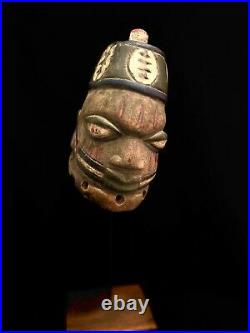
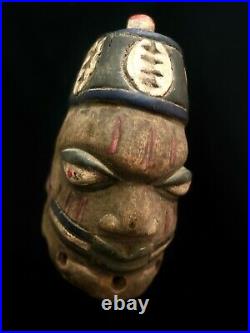
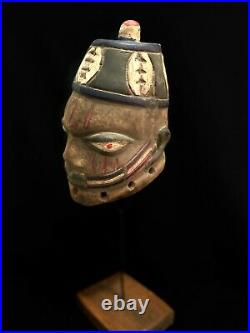
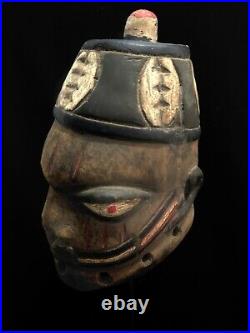
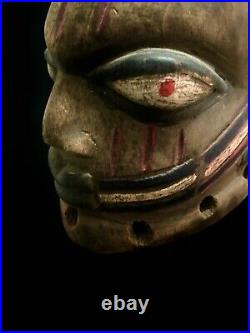
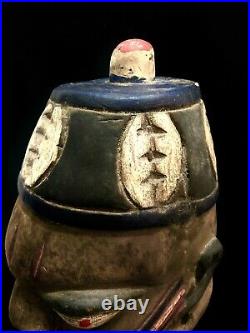
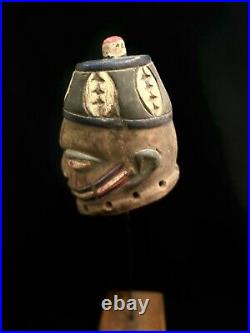
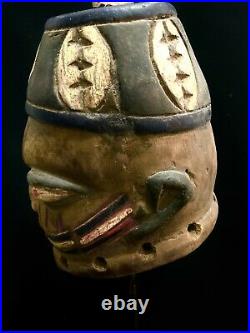
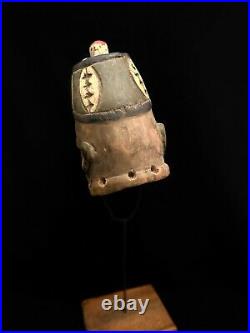

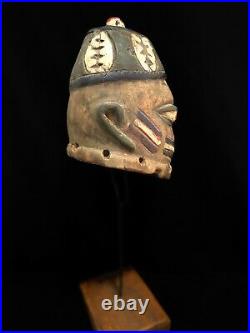


COLLECTION CENTER The African tribes. African mask The African tribes. African The African tribes. Traditional African masks play an important role in certain traditional African rituals and ceremonies. Masks serve an important role in rituals or ceremonies with varied purposes like ensuring a good harvest, addressing tribal needs in time of peace or war, or conveying spiritual presences in initiation rituals or burial ceremonies. Some masks represent the spirits of deceased ancestors. Others symbolize totem animals, creatures important to a certain family or group. In some cultures, like the Cuba culture of Zaire, masks represent specific figures in tribal mythology, like a king or a rival to the ruler. The wearer of the mask is often believed to be able to communicate to the being symbolized by it, or to be possessed by who or what the mask represents. Dogon ceremonial mask in use. Ritual and ceremonial masks are an essential feature of the traditional culture of the peoples of a part of Sub-Saharan Africa, e. Roughly between the Sahara and the Kalahari Desert. While the specific implications associated with ritual masks widely vary in different cultures, some traits are common to most African cultures. For instance, masks usually have a spiritual and religious meaning and they are used in ritual dances and social and religious events, and a special status is attributed to the artists that create masks to those that wear them in ceremonies. In most cases, mask-making is an art that has been passed on from father to son, along with the knowledge of the symbolic meanings conveyed by these masks. African masks come in all different colors, such as red, black, orange, and brown. In most traditional African cultures, the person who wears a ritual mask conceptually loses his or her human life and turns into the spirit represented by the mask itself. [1] This transformation of the mask wearer into a spirit usually relies on other practices, such as specific types of music and dance, or ritual costumes that contribute to the shedding of the mask-wearer’s human identity. The mask wearer thus becomes a sort of medium that allows for a dialogue between the community and the spirits (usually those of the dead or nature-related spirits). Masked dances are a part of most traditional African ceremonies related to weddings, funerals, initiation rites, and so on. Some of the most complex rituals that have been studied by scholars are found in Nigerian cultures such as those of the Yoruba and Edo peoples, rituals that bear some resemblance to the Western notion of theater. Since every mask has a specific spiritual meaning, most traditions comprise several different traditional masks. The traditional religion of the Dogon people of Mali, for example, comprises three main cults (the Awa or cult of the dead, the Bini or cult of the communication with the spirits, and the Lebe or cult of nature); each of these has its pantheon of spirits, corresponding to 78 different types of masks overall. It is often the case that the artistic quality and complexity of a mask reflects the relative importance of the portrayed spirit in the systems of beliefs of a particular people; for example, simpler masks such as the kple kple of the Baoulé people of Côte d’Ivoire (essentially a circle with minimal eyes, mouth and horns) are associated with minor spirits. Masks are one of the elements of great African art that have most evidently influenced European and Western art in general; in the 20th century, artistic movements such as cubism, fauvism and expressionism have often taken inspiration from the vast and diverse heritage of African masks. [4] Influences of this heritage can also be found in other traditions such as South- and Central American masked Carnival parades. African masks are usually shaped after a human face or some animal’s muzzle, albeit rendered in a sometimes highly abstract form. The inherent lack of realism in African masks (and African art in general) is justified by the fact that most African cultures clearly distinguish the essence of a subject from its looks, the former, rather than the latter, being the actual subject of artistic representation. An extreme example is given by nwantantay masks of the Bwa people (Burkina Faso) that represent the flying spirits of the forest; since these spirits are deemed to be invisible, the corresponding masks are shaped after abstract, purely geometrical forms. Stylish elements in a mask’s looks are codified by the tradition and may either identify a specific community or convey specific meanings. For example, both the Bwa and the Buna people of Burkina Faso have hawk masks, with the shape of the beak identifying a mask as either Bwa or Buna. In both cases, the hawk’s wings are decorated with geometric patterns that have moral meanings; saw-shaped lines represent the hard path followed by ancestors, while checkered patterns represent the interaction of opposites (male-female, night-day, and so on) [5]. Traits representing moral values?? Are found in many cultures. Masks from the Senufo people of Ivory Coast, for example, have their eyes half closed, symbolizing a peaceful attitude, self-control, and patience. In Sierra Leone and elsewhere, small eyes and mouths represent humility, and a wide, protruding forehead represents wisdom. In Gabon, large chins and mouths represent authority and strength. [5] The Grebo of the Ivory Coast carve masks with round eyes to represent alertness and anger, with the straight nose representing an unwillingness to retreat. SEND BY DHL EXPRESS. This item is in the category “Collectibles\Cultures & Ethnicities\African\1900-Now\Masks”. The seller is “amiteini” and is located in this country: GH. This item can be shipped worldwide.
- Handmade: Yes
- Modified Item: No
- Country/Region of Manufacture: Congo
- Culture: African
- Provenance: Ownership History Not Available
